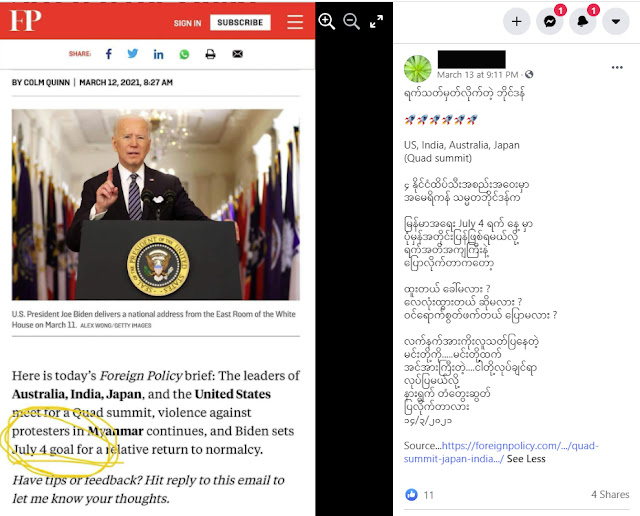 |
| Protesters in Nyaungshwe held signs asking for UN, US intervention. Photo by Robert Bociaga Olk Bon, licensed from Shutterstock.com |
A Message in the Candlelight
Some commented sardonically that perhaps the embassy staff was warning the people of an impending power cut. But others took the art of interpretation to a whole new level. |
| Facebook users began speculating about possible G7 involvement to end Burma's coup. |
The Designation that Missed the Mark
In response to escalating violence in Burma, the United States is designating two officials and two military units today. We call again on the military regime to release those unjustly detained, halt the brutal killings, and return power to the democratically elected government.
— Secretary Antony Blinken (@SecBlinken) March 22, 2021
A careful reading of the State Department's press release reveals the true nature of the "designation." The U.S. was adding Burma’s Chief of Police, Than Hlaing, and Bureau of Special Operations commander, Lieutenant General Aung Soe, along with the 33rd and 77th Light Infantry Divisions to the list of individuals and entities under sanctions.
Any punitive measure against those responsible for the atrocities is welcome, of course, but what the Burmese people really want to see now is robust, concrete action from the international community. Past experiences (the 1988 and 2007 uprisings, for example) have shown that sanctions and statements of rebuke won't stop the Burmese army's terror campaign. If the people seem impatient, it's because their wait is measured not in hours and days but in lives. According to the Assistance Association for Political Prisoners, Burma, 261 people have been killed since the coup began, and more than 2,600 have been arrested.
Requesting R2P in Hashtags
Recently, many have resorted to directly requesting the UN Security Council to invoke the Responsibility to Protect (R2P) doctrine for Burma. They did so with a misguided hashtag campaign.
The campaign might have begun while the UN Security Council was in session, as a virtual cry for help. But soon it took on a life of its own, with the mistaken idea that, if enough people reshare the hashtag #WeNeedR2PinMyanmar, the member states will have no choice but to invoke the clause.
One post reads, "This is really important everyone. Please reshare this post with this image. It has already reached 500,000. We need to surpass 1 million to get the help we need."
Another reads, "Please post this update for UN. We need to reach 1 million before 8:30 tonight. We have only 65 more to go."
 |
| A post requesting R2P via Facebook. |
 |
| A post with hashtags requesting R2P for Burma. |
A Dubious Deadline
A week ago, a poorly punctuated sentence in Foreign Policy's news led many Burmese to think U.S. President Biden was ready to launch a military intervention. The problematic sentence runs, "The leaders of Australia, India, Japan, and the United States meet for a Quad summit, violence against protesters in Myanmar continues, and Biden sets a July 4 goal for a relative return to normalcy."
A number of Burmese social media users seized upon this to mean Biden has set July 4--America's Independence Day--as the deadline for reversing the coup in Burma. They began sharing the post, remarking "Biden has set a deadline"--in other words, an ultimatum for Min Aung Hlaing and the gang.
What they missed was the section a few paragraphs below where it says, "Biden also set a date for Americans to return to something close to pre-pandemic normalcy: July 4."
An Ernest Question
One might be tempted to laugh at the gullible Burmese social media users for their misreading. But to them, it's much more logical to believe the world powers--especially the western democracies--are gearing up to come to their defense, to go into combat. To them, it's inconceivable that the countries that have promoted human rights and freedom would forsake them, to expect them to take on the battle-hardened, well-equipped military with nothing but homemade shields and construction helmets.
In late February, Nyi Nyi Aung Htet Naing asked on Facebook, "How many dead bodies [does] UN need to take action?" The next day, he was shot dead in a protest in Rangoon, as reported by Reuters.
His Facebook post deserves an answer.
 |
| A Facebook user believes Biden has set a deadline to reverse the coup in Burma. |
No comments:
Post a Comment